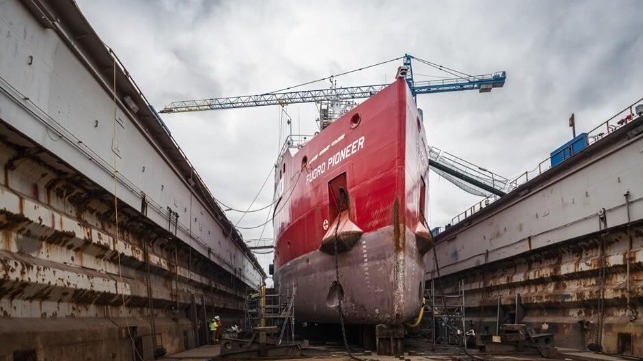Fugro Partly Converts a Survey Vessel to Run on Methanol

Dutch multinational Fugro plans to partly convert one of its geophysical survey vessels to run on methanol, a low-carbon fuel that is expected to play a central role in decarbonizing the shipping industry.
The company announced that Fugro Pioneer is ready to be equipped with methanol engines after converting related components on board. The vessel, which is currently in dry dock, underwent critical adjustments that will allow two of its four original engines to be replaced by methanol engines.
The decision to replace just two of the engines is designed to ensure that the survey vessel can still offer services in regions where green methanol is not yet available. Fugro said that the delivery and installation of the methanol-capable engines will happen in the second half of the year.
Built in 2014 by Damen Shipyards Galati, the 170-foot vessel uses diesel-electric propulsion. The compact survey ship is designed for light geotechnical work, environmental baseline surveys, monitoring and inspection and moon pool deployments. The vessel has mainly been deployed in conducting geoscience surveys for wind farm development.
Conversion of the vessel to run on the low-carbon fuel is part of the Methanol as Energy Step Towards Emission-free Dutch Shipping project, which is being funded by the Netherlands Enterprise Agency (RVO) with a sum of $27 million.

that matters most
Get the latest maritime news delivered to your inbox daily.
“The methanol conversion of the Fugro Pioneer is not only a pivotal move in diminishing our vessel emissions as part of our Net Zero 2035 journey, but it also stimulates the green methanol market. We will continue to invest in innovative solutions that not only help our clients, but also support us in reaching our company objectives,” said Barbara Geelen, CFO at Fugro.
The company said that there is an increased focus on sustainability in tenders for the offshore market, and vendors that embrace green methanol as a fuel can help wind farm developers and O&G clients reach their decarbonization objectives.
